

Iran says it watered down, converted over 200 kg of enriched uranium. Iran : Les 35 ans de la Révolution islamique en images. Révolution Il y a 35 ans, après des mois de manifestations, le régime du Shah d'Iran Mohammad Reza Pahlavi, lâché par son allié américain, tombe au profit de l'ayatollah Rouhollah Khomeiny, revenu après 15 ans d’exil, le 1 février 1979.
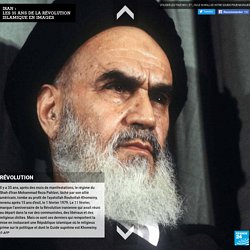
Le 11 février, marque l’anniversaire de la Révolution iranienne qui avait réuni au départ dans la rue des communistes, des libéraux et des religieux chiites. Mais ce sont ces derniers qui remportent la mise en instaurant une République islamique où le religieux prime sur le politique et dont le Guide suprême est Khomeiny. © AFP « Le grand Satan » Dès son avènement, la République entame un bras de fer idéologique et politique avec le « Grand satan » américain et affiche son hostilité à Israël. 1 million de martyrs Islamisation et répression Khomeiny puis Khamenei En 1989, après la mort du père de la Révolution iranienne l'ayatollah Rouhollah Khomeiny, c’est l’ancien président la République islamique Ali Khamenei qui prend les commandes du pays.
La détente. Iran’s Foreign Minister Backs US-Russia Plan for Syria. TEHRAN, Iran — My first visit ever at Iran's Foreign Ministry gave me a real impression of the country I'm reporting from.
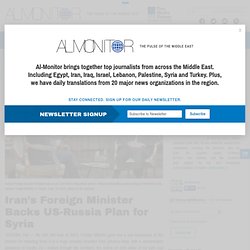
It is a huge complex inherited from previous eras, with a concentrated ambience of royalty. As I walked through the corridors, the rooms on both sides of my path had plaques with the names of certain countries or regions around the world. These are the offices of the Iranian undersecretaries that take care of each part of the world. Report on Larijani Attack Reveals Factional Divide in Iran. Iran's parliament speaker Ali Larijani speaks to the media during a news conference in Tehran, Nov. 30, 2011.
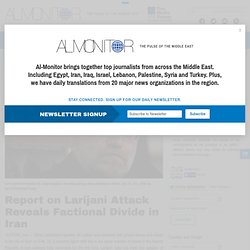
(photo by REUTERS/Caren Firouz) Author: A Correspondent in Tehran Posted August 28, 2013. Who Is Ali Khamenei? In June, Hassan Rouhani was elected president of the Islamic Republic of Iran.
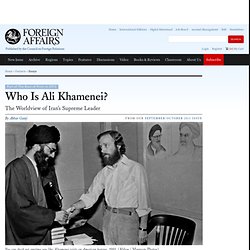
Rouhani ran as a reform candidate, and many have interpreted his victory as a harbinger of a possible liberalization or rationalization of Iranian domestic and foreign policy. But the dominant figure in Iranian politics is not the president but rather the supreme leader, Ayatollah Ali Khamenei. Iranian Diplomacy. Iran and the US: Time to Talk.
Interviewee: Hooman Majd .
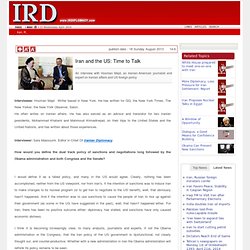
Writer based in New York. An Interview with Hooman Majd (Part 1: The Presidential Election) Hooman Majd is the grandson of an ayatollah, son of a career diplomat, and related by marriage to former Iranian president Mohammad Khatami.
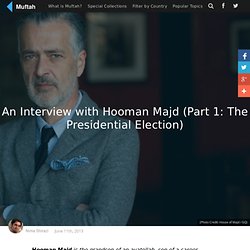
Born in Tehran, he spent his formative years globe-trotting for his father’s work and was educated in schools in San Francisco, New Delhi, Tunis, London and Washington D.C. After many years in the entertainment business, heading Island Records and producing at Palm Pictures, Majd visited Iran in 2003, the first time he had been back to his birthplace in over thirty years.
Over the past decade, he has traveled to Iran often and been a consistently astute and articulate observer of Iranian society and politics. Majd recently spent a year living in Iran researching his newest book, “The Ministry of Guidance Invites You to Not Stay: An American Family in Iran,” which will be published this Fall. Interviewing Hooman Majd (Part 2: It’s the Economy & Threats Stupid!) Hooman Majd is the grandson of an ayatollah, son of a career diplomat, and related by marriage to former Iranian president Mohammad Khatami.
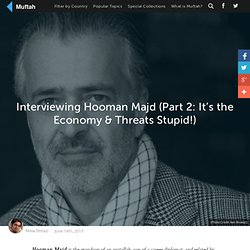
Born in Tehran, he spent his formative years globe-trotting for his father’s work and was educated in schools in San Francisco, New Delhi, Tunis, London and Washington D.C. After many years in the entertainment business, heading Island Records and producing at Palm Pictures, Majd visited Iran in 2003, the first time he had been back to his birthplace in over thirty years.
Over the past decade, he has traveled to Iran often and been a consistently astute and articulate observer of Iranian society and politics. Uskowi on Iran - اسکویی در باره ایران. Huge Victory for Iran’s Reformist Movement Hassan Rouhani, representing the reformists and moderates in Iran’s presidential election, scored an impressive first-round victory over his conservative rivals.
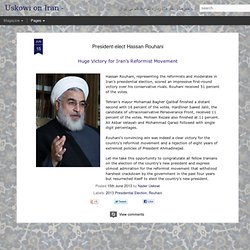
Rouhani received 51 percent of the votes. Tehran’s mayor Mohamad Bagher Qalibaf finished a distant second with 16 percent of the votes. Hardliner Saeed Jalili, the candidate of ultraconservative Perseverance Front, received 11 percent of the votes. Mohsen Rezaie also finished at 11 percent. La cybermenace iranienne donne des sueurs froides à Washington - IRAN.
L'EI attribue à deux de ses "partisans" la tuerie de San Bernardino En savoir plus Syed Farook et Tashfeen Malik, un couple aux ambitions radicales En savoir plus Les négociateurs de 195 pays adoptent un projet d'accord sur le climat En savoir plus Attentats de Paris : un deuxième homme mis en examen en France En savoir plus Triple attentat-suicide meurtrier sur une île du lac Tchad En savoir plus Une exposition sur l’homosexualité vandalisée à Toulouse En savoir plus L'Irak exige le retrait immédiat des soldats turcs de son territoire En savoir plus La COP21, côté artistes En savoir plus Face à Bachar al-Assad, Paris fait marche arrière En savoir plus Profils, motivations : qui sont les jihadistes made in America ?
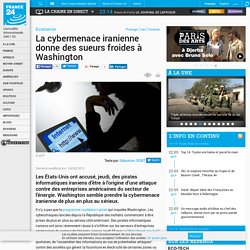
Who Are Iran's Voters? The Gap Between the US And Israel on a Nuclear Iran. US President Barack Obama and Israeli Prime Minister Benjamin Netanyahu tour the Israel Museum in Jerusalem, March 21, 2013.
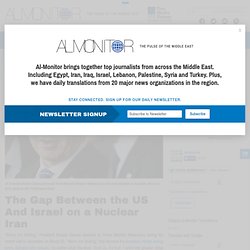
(photo by REUTERS/Jason Reed) Author: Ben Caspit Posted April 19, 2013 “We’re not bluffing,” President Barack Obama declared to Prime Minister Netanyahu during his recent visit to Jerusalem on March 20. “We’re not bluffing,” has become the American refrain during every dialogue with Israelis, no matter what the level. How Iran Won the War on Drugs. “Selling poppies is easier than selling diamonds and gold in Afghanistan, and just as valuable,” an official in the Afghan Ministry of Public Health told me in 2011. “The [police] is corrupt, the farmer is poor, and the addict always buys.” He was right. The failure of international forces in Afghanistan to curb the narcotics trade presents one of the gravest threats to the country’s long-term stability and security. Even though the U.S. Don't Go Baghdad on Tehran. The Iraq War might seem a thing of the past. But nearly ten years after combat began, the United States and its allies are using policies to address the Iranian nuclear challenge that are eerily similar to those it pursued in the run-up to Operation Enduring Freedom.
Just as they did with Saddam Hussein, concerned governments have implemented economic sanctions, diplomatic isolation, and low-level violence to weaken the Iranian regime and prevent it from acquiring nuclear weapons, with the long-term objective of regime change. In Iraq, and seemingly now in Iran, diplomacy and inspections became a means to an end: building up a casus belli. The strategy failed miserably in Iraq a decade ago. Is it Ahmadinejad’s last hurrah? Mahmoud Ahmadinejad, the impenitent president of Iran, arrived in New York for his eighth, and presumably last, official visit on a late September Saturday night. The media hung on his every belligerent, homophobic or anti-Israeli word — while at the same time dismissing him as a lame duck, irrelevant to Iran’s future. But missing in all the coverage was what Ahmadinejad’s legacy may be and whether he’ll have a political future beyond Iran’s presidential election in June.
Beleaguered at home by infighting and the dire economic situation – due to sanctions, but also his administration’s mismanagement – Ahmadinejad seemed even more eager to enjoy his usual week of Western media attention. His schedule was packed – not just with media appearances but also meetings with peace groups, anti-capitalist protest groups and scholars. Turkey's Challenge and the Syrian Negotiation. By Reva BhallaVice President of Global Affairs Syrian Information Minister Omran al-Zubi harshly criticized the Turkish government early last week over Ankara's proposal that an interim government succeed the al Assad regime, saying that "Turkey isn't the Ottoman Sultanate; the Turkish Foreign Ministry doesn't name custodians in Damascus, Mecca, Cairo and Jerusalem.
" Being the spokesman for a pariah regime requires a mastery of propaganda. Al-Zubi has not disappointed in this regard, mounting a strong rhetorical offensive against Syria's powerful northern neighbor. While his latest rebuke of Turkey will not save the al Assad regime (much less his own career), he is tapping into a powerful narrative in the region, one that will have stronger and stronger resonance in the Arab world as Turkey is forced to play a more assertive role in the region. Should Iran Regime Worry That Tehran's Bazaaris Are Irked? Iranians eat lunch in a popular restaurant in Tehran's Grand Bazaar, March 16, 2008.
(photo by REUTERS/Ahmed Jadallah) Author: Sabah (Turkey) Posted October 10, 2012 Naturally, we Turks are focused on the Syrian crisis. But the international community is already sending out signals about another crisis which is, of course, Iran. Summary⎙ Print The Grand Bazaar in Tehran is a pillar of Iranian society and a potent political force — the shah credited it with his downfall.
Author Erdal Safak Posted October 10, 2012. Is Ahmadinejad Facing a Final Showdown with Rafsanjani? Former Iranian president Akbar Hashemi Rafsanjani attends Iran's Assembly of Experts' biannual meeting in Tehran March 8, 2011. (photo by REUTERS/Raheb Homavandi) Author: Shahir ShahidSaless Posted October 2, 2012 Akbar Hashemi Rafsanjani (known as both Hashemi and Rafsanjani) is one of the founders of the Islamic Republic of Iran.
Rafsanjani, ex-chairman of the Iranian Parliament and the president of Iran from 1989 to 1997, currently heads the Expediency Council, which acts as the advising body to Supreme Leader Ayatollah Sayyed Ali Hosseini Khamenei. The Expediency Council also mediates between the parliament and the Guardian Council that vets all legislation. The Return of Rafsanjani? Don’t Count on it. Poland and Persia during the Safavid Period. L’Iran s’appuierait sur l’Irak pour contourner les sanctions internationales - IRAN. In contentious Tehran summit, Ban sees valuable diplomatic opening. Ban Ki-moon has not yet announced plans to travel to Tehran later this month for a summit of the Non-Aligned Movement -- a group of 120 developing governments -- and meetings with Iranian President Mahmoud Ahmadinejad.
A US Military Move in Syria Could Quiet Iran-Israel War Drums. White House Gives Blanket OK For Earthquake Aid to Iran.
Iran-Turkey. Nuclear weapons. Sanctions Are Only a Stop-Gap. To judge the effectiveness of Western sanctions against Iran, it is important to first establish their purpose. U.S. officials and their European counterparts have set out a number of different goals for the sanctions regime, including deterring the proliferation of nuclear technology across the Middle East, as other countries imitate Iran, and persuading Iran to comply with the UN Security Council’s orders to suspend all nuclear enrichment.
The sanctions have met some of those aims and failed to meet others. But for the Obama administration, they have succeeded in one crucial way -- bringing Iran back to the negotiating table. Israel's Spy Revolt - By Natan Sachs. Something has gone very wrong with Israel's posture on Iran's nuclear program. While Prime Minister Benjamin Netanyahu and Defense Minister Ehud Barak lead a confrontational approach -- including dramatic interviews and speeches to U.S. audiences that have convinced many that Israel might soon strike Iran's nuclear facilities -- the former heads of Israel's intelligence agencies have come out publicly against the government's position.
Choke Point. Wywiad z D. Krajewskim: Iran i jego przewidywalna polityka wschodnia. The Ayatollah Under the Bed(sheets) - By Karim Sadjadpour. The oil smugglers of Tehran. Backed Into a Corner - By Hossein Mousavian. Crisis Guide: Iran. Iran. A View Inside Iran - In Focus. Why Israel Should Learn to Stop Worrying and Love the Bomb. Israel - Azerbaijan. Maciej Pietruszewski: Kwestia irańskiego programu jądrowego w stosunkach rosyjsko-amerykańskich. Supreme Loser - By Ali Vaez.
Ahmadinejad – the full exclusive interview.